- Home
- Terry C. Johnston
Shadow Riders: The Southern Plains Uprising, 1873 (The Plainsmen Series) Page 18
Shadow Riders: The Southern Plains Uprising, 1873 (The Plainsmen Series) Read online
Page 18
“Well … I just assumed … what with you being older—and Rebecca all likely being older too … them two being sisters—”
“That’s where you made your first big mistake—is thinking, you dumb mick! Just like your dear departed Uncle Liam, God rest his soul. Samantha is Rebecca’s half sister, and she’s ain’t been of marrying age all that long.”
“Oh,” Jack Stillwell said, some sudden and sincere interest pricking his voice. “Just how old … or young is Samantha?”
“She’s twenty-two, Jack.”
Stillwell looked at Donegan and winked. “Sounds to me like she might care for a younger man, Seamus.”
The Irishman shook his head. “Beware, Jack. Something wrong with a woman who couldn’t find a husband in Kansas. Best we both stay out of her way.”
Grover wagged his head. “Hard for me to believe I’m hearing you boys say such things. You ever look around you at the quality of fellas coming out to Kansas?”
“Never was much a one for watching the boys—was you, Jack?” Donegan asked. He and Stillwell laughed heartily.
“Them that wasn’t married and had a wife and passel of young’uns already was surely a hard lot—not the sort for the likes of Rebecca or Samantha.”
“So, did Rebecca really look over the crop before she decided on you, Sharp?” Seamus asked.
“I suppose she did, and that’s why she chose me. The rest was real hard cases—buffalo hunters mostly. Those what was coming in to the western part of the territory to whittle away what they could of the Republican herd.”
“Hide hunters,” Stillwell repeated. “That ain’t the sort who’s made to settle down with a wife and make a family out of things.”
“Say, Sharp—did we mention we ran onto a hide hunter who knew of you?” Donegan inquired.
“No, you didn’t. Who was he and where’d you run onto him?”
“Handsome young fella. ’Bout my age,” Stillwell replied. “Almost as good-looking as me too, come to think of it.”
“C’mon, now—who was he?”
“Name of Dixon.”
“Billy Dixon?”
“That’s right,” Stillwell answered. “Met him up at Dodge City.”
“So they ended up having to change the name of the town after all, did they?” Sharp asked. “Yeah, I knew Dixon back to the winter we went marching off with Custer down into Indian Territory.” He looked at Donegan, “When you went off with Carr’s Fifth Cavalry and Buffalo Bill Cody, Irishman.”*
“That’s what Dixon told us,” Seamus added. “The young fella thinks the world of you for what you taught him that winter.”
“What I taught him? Hell, I was nothing more’n just a scout riding with Pepoon, under Joe Milner and Jack Corbin, nothing special. And the lad was a teamster. Eager and bright, as I remember him—eager to learn.”
“But he’s one of them hide hunters you said wasn’t good enough for Samantha,” Donegan said with a smile.
“Oh, but Dixon struck me as being a different sort.”
“No, he didn’t smell gamey to me, if that’s what you mean,” Jack said, grinning.
“More’n that—it seemed he had something in the way of good horse sense about him, and cared a bit about himself,” Seamus added.
“That does sound like the Billy Dixon I knew who teamstered for Lieutenant Bell of the Seventh Cavalry. Besides hanging out in a saloon in Dodge City and running onto the likes of you two rummies—what else is the lad up to now?”
“I suppose he’s waiting to hunt more buffalo,” Stillwell answered. “Said he’d just come in with some hides he’d taken south of the dead line.”
Grover’s eyes narrowed. “Billy Dixon’s rode south of the dead line to take buffalo?”
“What he told us.”
The old scout wagged his head. “And I just gave Dixon more credit for having good horse sense. Damn. That’s suicide work down there across the dead line.”
“The army shoot a man for crossing into Indian Territory for no good reason?” Seamus asked suspiciously.
“No, not the army,” Grover replied. “That country out west of here is the last buffalo ground south of the Niobrara on the whole of the central and southern plains. The very, goddamned last, you understand. And now the Kiowa and those bloodthirsty Comanche are dead set on keeping it that way: out of the hands of the white buffalo hunters.”
“Then Billy Dixon’s scalp ain’t worth much,” Stillwell said quietly.
“No man’s is,” Grover replied, “he goes hunting buffalo south of the dead line.”
Chapter 17
October 1873
As much as Seamus might not want Sharp Grover to know, he had to admit, Samantha Pike was a good-looking woman.
In many ways she reminded him of Jennifer Wheatley,* although the memories of her were fading.
Samantha was a bit heavier, bigger boned, and most definitely fleshy in all the right places. At least in all those places Seamus Donegan found himself staring when he didn’t find Miss Pike staring back at him. The full promise of hips and the curve of her rounded rump molding into the top of her thighs. And those breasts, amply snuggled into a deep cleavage. He imagined how they must be straining against their buttons, as he dreamed of how those breasts might taste. What sheer delights, he considered, getting his hands on their soft, creamy flesh, kissing and burying his face between them as she arched her back to him, commanding him to take her—
Donegan decided he had clearly been too long without a woman, and had determined he would see to that concern once he and Jack rode back through Jacksboro, heading north for the Red River and the Kiowa-Comanche reservation at Medicine Bluff. But as things turned out, Seamus did not find himself with an occasion to slip back to one of Jacksboro’s notorious houses of prostitution. One evening at supper instead, he had been told that Jack and Sharp had decided to push north the next morning. So a much embarrassed Seamus was left to try to explain why he was eager to ride into Jacksboro for that last night, a ticklish proposition, what with Rebecca Grover and her young sister in the room as Donegan stammered and stuttered and finally gave up trying to explain.
Especially those eyes, he thought again now, looking back. And the way Samantha used them to bounce from Jack Stillwell to the Irishman and back again. As if measuring them both for a wedding suit, Seamus thought. There weren’t many who could even make him think such things—but then, Samantha Pike was altogether a different sort of woman. Much like Jennie had been … almost eight years gone now since last he had seen the fire in her hair high on the Montana Road.
“She’s likely long married now and got at least two more children, Seamus,” he told himself that night after the sun had sunk on the far side of the Staked Plains and he sat alone on Sharp’s porch, stuffing tobacco into his corncob pipe. It brought him fond remembrance of trader McDonald at Fort McPherson, Nebraska … and Bill Cody. Married himself, to that beauty Louisa. A daughter, Arta—who must be all of eight years old now.*
Somehow, those thoughts of women and children tugged at a secret, well-hidden place within him, and brought to the rippled surface of his need the lines of verse writ by Irish poets:
A heart made full of thought
I had, before you left.
What man, however prideful,
But lost his perfect love?
Grief like the growing vine
Came with time upon me.
Yet it is not through despair
I see your image still.
A bird lifting from clear water,
A bright sun put out
—such my parting, in troubled tiredness,
From the partner of my heart.
“Do you wish to be alone?”
Seamus turned in the darkness, his face gone hot with embarrassment as he found her shadow at the twilit corner of the porch.
“No,” he finally answered, stuffing the pipe back into his mouth. “I mean—it’s all right.”
“I just heard you whi
spering out here a minute ago,” Samantha said. “I thought you were talking to someone.”
“No one else here,” he admitted the obvious.
She came close, no sign of nervousness to her. “You talk to yourself often, Mister … I’m sorry. Seamus.”
“No,” and he drew angrily on the pipe stem. Ashamed of himself for feeling this way around a woman. A man so assured of himself most of the time, easily moving in the company of hard men and sharp-edged circumstances—made so suddenly uncomfortable around Jennie Wheatley … and now Samantha Pike. She swept behind him on the edge of the porch, the air awash with the smell of lye soap and freshly laundered petticoats hung to dry on the line out back. In private Seamus savored it in spite of himself, then listened as she settled herself at the edge of the porch, a judicious distance from him.
“It’s … I was just repeating some poetry I know,” he admitted, then felt the fool for saying it. Why he had babbled that to her, he did not know.
“Poetry,” she said as if trying out the word.
“Yes,” he replied a little too curtly. “Jack and Sharp inside?” Donegan asked, trying to change the subject, embarrassed that he had admitted he recited poetry.
“They’re helping Rebecca with the dishes and banking the fire for the night.”
“Sounds like they’re going to bed early.”
“Sharp wants an early start in the morning—this trip of yours north to Fort Sill,” she answered.
“It’s a good idea, I suppose. Should be finding my blankets meself.”
“Stay,” she said suddenly, a little strongly, then looked away at the night sky.
He was filled at that same instant with a sudden wonder of her, and believed he saw her blush there beneath the pale moonlight of north Texas.
“I mean—” and she stopped cold, her eyes imploring his for understanding. “It’s early … and I get … well, there’s not many people to talk to around here. I’d like you to stay up and talk to me, Seamus. If you would.”
“By the saints, but you’ve probably got a lot of young suitors paying you court, Samantha—a pretty girl like you.”
“You really think so?” she asked in a gush. “Really think I’m that pretty that men would want to court me?”
He smiled, more at ease now, warmed by her openness. “I’m certain of you being pretty—one of the prettiest women these eyes have seen in all my days. I find it hard to believe if you’re going to tell me you don’t have suitors from Jacksboro banging down your door here.”
She stared down at her slim hands she was kneading in her lap. “There have been some. But Rebecca helps me send them away.”
“Why, none of them good enough for you?”
The way her eyes shot up and held his made him realize he had made a mistake in this crude attempt to prod her sense of humor. Instead, his thoughtless question had pricked her stiff-backed pride. Those eyes that looked back at him betrayed a deeply wounded and vulnerable woman hiding behind them at that moment.
“I so want to find a man who … who doesn’t have dirt under his fingernails, Seamus. A man who doesn’t have to grub in this soil or raise cattle for his livelihood. But that’s the only kind of man that’s here.” She ground a handful of her cotton skirt between her palms. “How I wish I could go east—to a … city.”
He heard the magic inflection put on that last word. “You’ve never been to a big city?”
She turned to him in a rush and rustle of petticoats. “I’ll bet you’ve been—I mean, coming from Ireland, you had to. Tell me about them, Seamus. Tell me about the cities back east. What the people wear and what they eat. How they ride around on the paved streets in their fine carriages … going off to plays and operas every night after dining on oysters and fish from the great oceans, even fish eggs.”
“Seems you know quite a lot about cities back east for so young a woman.”
Samantha Pike stared at the dark, north Texas sky for a long time before she answered. “I can imagine. That’s all,” she finally said. “I hear something now and then about the busy, glorious life of folks on the East Coast. Never have I heard much about California.”
“What I saw of it wasn’t all that different than Denver City.”
“So you’ve been to California too?” she asked like a wistful child, her face flush with excitement in the starshine.
“Yes—”
“San Francisco?”
He wagged his head. “Never made it that far.* Not to the ocean.”
“Oh,” she sighed. “You are so lucky—able to travel at your own whim. Where and when you want to go. A man can do … well, a woman just can’t do that.”
“Saints preserve, Samantha—this is still a dangerous land for anyone. Especially a woman.”
“That’s why I want so to go back east.”
“Truth be, the city streets are as unsafe as that open prairie out there.” He used the stem of his pipe to jab home his point. “And at least on that prairie you have a chance of hiding from the hostiles. In the cities, like Boston—you can’t hide from the thieves and … the sort who would do a woman harm.”
“I can’t believe you about that,” she replied, instantly haughty.
It struck him as strange, that she would change from woman to woman to woman in a matter of a few minutes before his eyes. Here so harshly defiant when moments ago she was a child filled with wonder, then a vulnerable young woman.
“Better that I don’t tell you what I think of those cities back east then,” he replied, staring off into the night sky, refusing to look at the deadly mix of deep beauty and haughty fire that lit her eyes.
He listened to her sigh near him, a rustle of layers of cloth as she stood. When Seamus gazed up, Samantha was leaning back against a porch post, her hands behind her, staring longingly off into the distance.
“Will you tell me some more of your poetry, Seamus?”
“I’m not sure what I know is the kind of thing—”
“Do you know any love poetry, Seamus?” she interrupted him in a gush, swirling back down to settle beside him like a fluffy bird come to roost, bringing with her the heady rush of clean linen and lye soap, as much a perfume as any woman had used to overpower him.
He swallowed deeply, glancing only briefly at the heavy rise and fall of her breasts beneath the tight blouse. “Yes … I know—”
“Say it for me, please!” she begged, then did something surprising to them both in reaching without thought and took one of his hands in hers. “Please.”
In wide-eyed wonder he gazed down at her hands clutching his. Only then did she realize what she had done and quickly withdrew them.
“I got … a little, eager. I’m sorry.”
He smiled then, surprised himself as he reached out and caressed the back of her hand with his fingertips and said, “I liked it, Samantha. Liked your touch a lot.”
Staring at the big moon fully risen over the treetops, Seamus began his favorite James Clarence Mangan poem, an Irishman who lived the first half of this, the nineteenth century.
“This one’s called: ‘The Nameless One.’
Roll forth my son, like the rushing rive,
That sweeps along to the mighty sea;
God will inspire me while I deliver
My soul of thee!
Tell thou the world when my bones lie whitening
Amid the last homes of youth and eld,
That there was once one who veins ran lightening
No eye beheld.
Tell how his boyhood was one drear night-hour,
How shone for him, through his griefs and glooms,
No star of all heaven sends to light our
Path to the tomb.
Roll on, my song, and to after ages
Tell how, disdaining all earth can give,
He would have taught men, from wisdom’s pages,
The way to live.
And tell how trampled, derided, hated,
And worn by weakness, disease,
and wrong,
He fled for shelter to God, who mated
His soul with song—
Tell how this Nameless, condemned for years long
To herd with demons from hell beneath,
Saw things that made him, with groans and tears, long
For even death.
Go on to tell how, with genius wasted,
Betrayed in friendship, befooled in love,
With spirit shipwrecked, and young hopes blasted,
He still, still strove.
Him grant a grave to, ye pitying noble,
Deep in your bosoms! There let him dwell!
He, too, had tears for all souls in trouble,
Here, and in hell.”
For long moments after he finished, she said nothing to disturb the heavy silence between them. Seamus finally turned to look at her and found her pretty, full mouth open in amazement. She blinked a few times, as if coming to after a lapse of consciousness.
“I never … never would have expected you to know such beautiful, powerful words. Words I’m sure you meant to stir my soul, Seamus.”
He felt uncomfortable at her praise, at her sudden declaration. “It is just a poem I like, and memorized many years ago to help fill some of the pain of my own—”
Seamus didn’t finish. He could not, finding her suddenly at him—her soft, wet lips crushing his, her hands and arms encircling him savagely, pulling him against her.
When she withdrew slightly, Samantha was gasping as if starved for air.
“I’ve always wanted to do that to a man,” she announced. “To do that when I wanted to be kissed—not having to wait for a man to figure I need a kiss. I grew so tired of waiting for you to kiss me, Seamus.”
He ran the tip of his tongue across his lips, tasting her again before he said, “If I had known it would be so … such a treat—I would have done it long ago, Samantha.”
“Then—we’re both happy,” she said, suddenly pressing herself into him again with a second embrace and a much longer, lingering kiss.
When she pulled away this time, Seamus was no longer suffering merely surprise, but intense arousal. The scent of her, the taste of her, the warmth of her full lower lip, which seemed to dominate the way she opened her warm, fleshy mouth to him. And the press of the firm, fleshy mounds against him. He glanced at them, almost unable to take his eyes off the way her chest heaved, rising and falling.

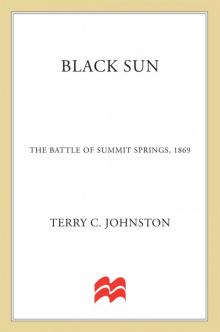 Black Sun, The Battle of Summit Springs, 1869
Black Sun, The Battle of Summit Springs, 1869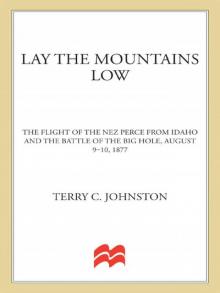 Lay the Mountains Low
Lay the Mountains Low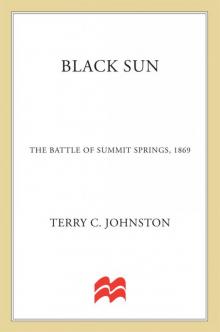 Black Sun: The Battle of Summit Springs, 1869 (The Plainsmen Series)
Black Sun: The Battle of Summit Springs, 1869 (The Plainsmen Series)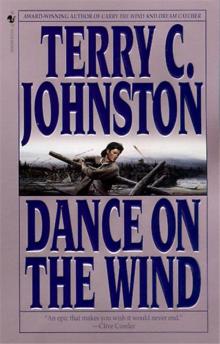 Dance on the Wind tb-1
Dance on the Wind tb-1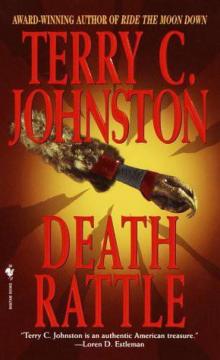 Death Rattle tb-8
Death Rattle tb-8 The Stalkers
The Stalkers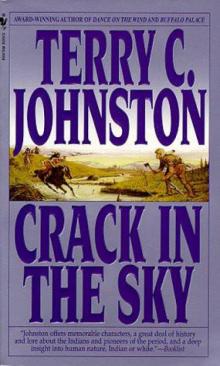 Crack in the Sky tb-3
Crack in the Sky tb-3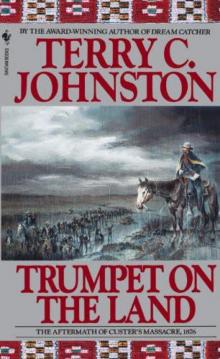 Trumpet on the Land: The Aftermath of Custer's Massacre, 1876 tp-10
Trumpet on the Land: The Aftermath of Custer's Massacre, 1876 tp-10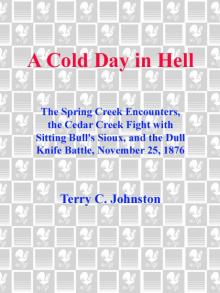 A Cold Day in Hell
A Cold Day in Hell Long Winter Gone: Son of the Plains - Volume 1
Long Winter Gone: Son of the Plains - Volume 1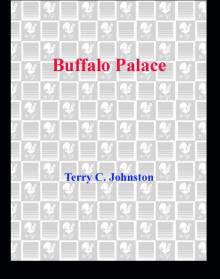 Buffalo Palace
Buffalo Palace Cries from the Earth
Cries from the Earth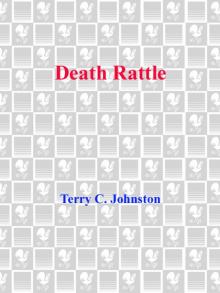 Death Rattle
Death Rattle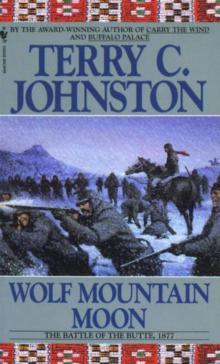 Wolf Mountain Moon: The Battle of the Butte, 1877 tp-12
Wolf Mountain Moon: The Battle of the Butte, 1877 tp-12 Crack in the Sky
Crack in the Sky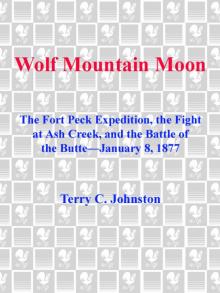 Wolf Mountain Moon
Wolf Mountain Moon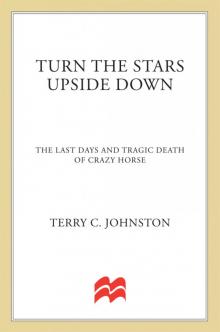 Turn the Stars Upside Down: The Last Days and Tragic Death of Crazy Horse
Turn the Stars Upside Down: The Last Days and Tragic Death of Crazy Horse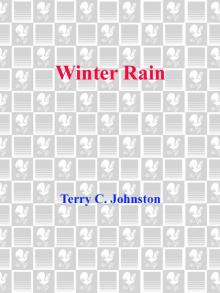 Winter Rain
Winter Rain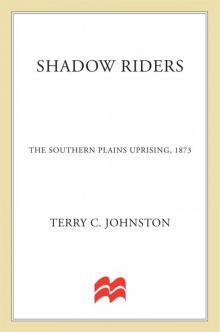 Shadow Riders: The Southern Plains Uprising, 1873 (The Plainsmen Series)
Shadow Riders: The Southern Plains Uprising, 1873 (The Plainsmen Series)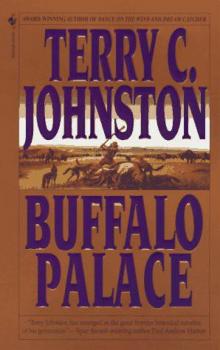 Buffalo Palace tb-2
Buffalo Palace tb-2 Cries from the Earth: The Outbreak Of the Nez Perce War and the Battle of White Bird Canyon June 17, 1877 (The Plainsmen Series)
Cries from the Earth: The Outbreak Of the Nez Perce War and the Battle of White Bird Canyon June 17, 1877 (The Plainsmen Series)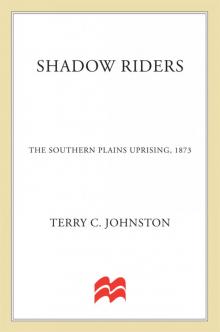 Shadow Riders, The Southern Plains Uprising, 1873
Shadow Riders, The Southern Plains Uprising, 1873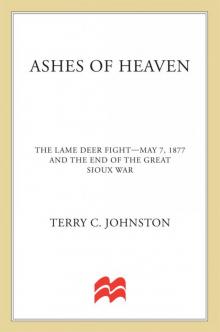 Ashes of Heaven (The Plainsmen Series)
Ashes of Heaven (The Plainsmen Series)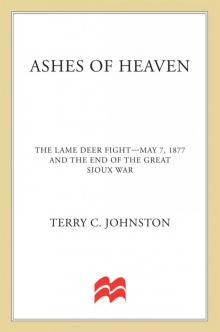 Ashes of Heaven
Ashes of Heaven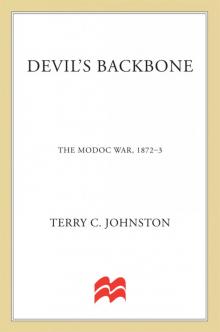 Devil's Backbone: The Modoc War, 1872-3
Devil's Backbone: The Modoc War, 1872-3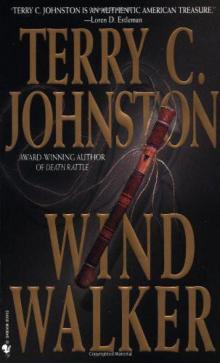 Wind Walker tb-9
Wind Walker tb-9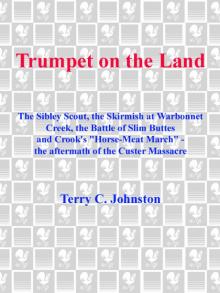 Trumpet on the Land
Trumpet on the Land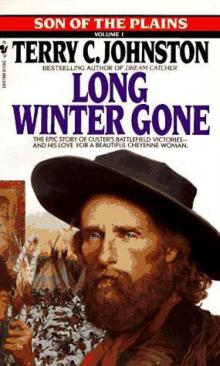 Long Winter Gone sotp-1
Long Winter Gone sotp-1 Dying Thunder
Dying Thunder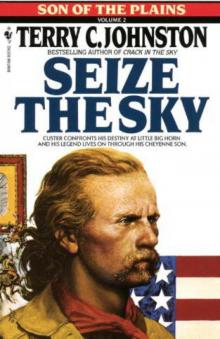 Seize the Sky sotp-2
Seize the Sky sotp-2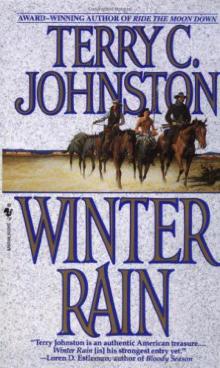 Winter Rain jh-2
Winter Rain jh-2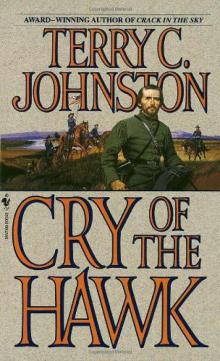 Cry of the Hawk jh-1
Cry of the Hawk jh-1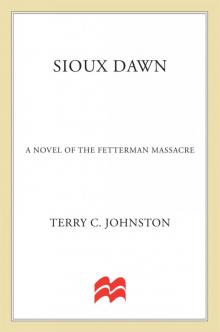 Sioux Dawn, The Fetterman Massacre, 1866
Sioux Dawn, The Fetterman Massacre, 1866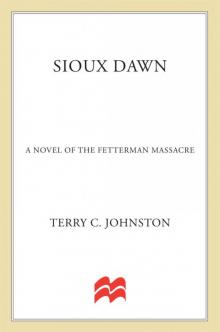 Sioux Dawn: The Fetterman Massacre, 1866 (The Plainsmen Series)
Sioux Dawn: The Fetterman Massacre, 1866 (The Plainsmen Series)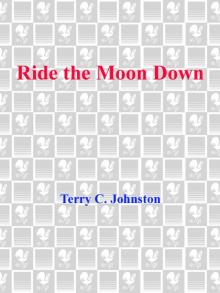 Ride the Moon Down
Ride the Moon Down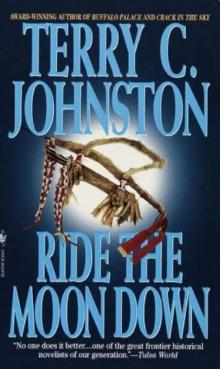 Ride the Moon Down tb-7
Ride the Moon Down tb-7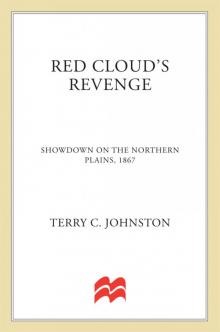 Red Cloud's Revenge
Red Cloud's Revenge Wind Walker
Wind Walker